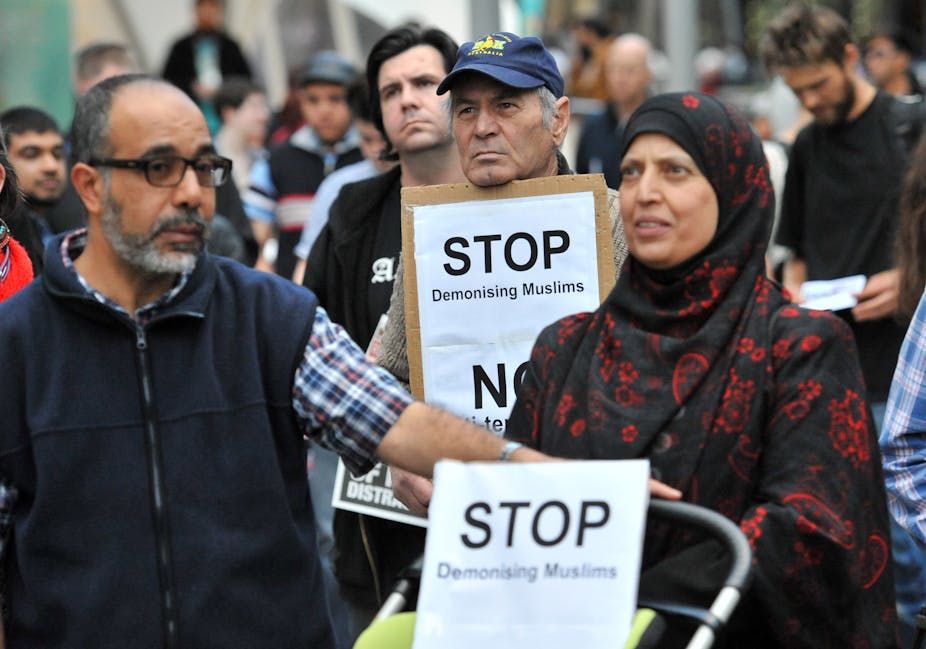The majority of Muslims in Australia condemn terrorism and extremism. But they also feel that counter-terrorism policing and laws unfairly target their community. This has generated a community backlash.
This is a key finding of research we have completed on the impact of counter-terrorism responses on Muslim communities in Australia. Preliminary findings from this research were reported in The Conversation.
Now we can report full results. These shine a light on the negative and unintended consequences of counter-terrorism activities on Muslim communities. The findings also show us what authorities can do to minimise these impacts.
The research has involved 14 focus groups, totalling 104 participants, and a survey of 800 Muslims living in Brisbane, Sydney and Melbourne.
Muslims feel under siege
Key findings from the focus groups were that the Muslim community feels under siege due to the social and political responses to terrorism. For instance, participants felt under constant attack and scrutiny, both politically and in the media. Respondents believed the media spread misinformation about Islamic principles (for example in relation to sharia, jihad, halal).
Participants stressed that Islamist terrorist groups were not true Muslims and distorted the meaning of Islamic principles. However, they said that they felt reluctant to publicly voice an opinion about Islam, foreign policy issues, terrorism or counter-terrorism activity out of fear they would be labelled extremists. These views were particularly strong among young participants.
A key concern was that police could “do whatever they wanted” when using counter-terrorism laws. When it came to efforts to combat terrorism, participants disliked the use of the term “moderate” Muslim to delineate between what might be regarded as a more acceptable form of Islam, or Muslims who opposed the use of Islam to justify terrorist acts.
Consultation promotes co-operation
In the focus groups, participants discussed the merits of different police and legal efforts to combat terrorism or radicalisation. Consultative approaches, such as engagement with Muslim leaders (Imams) and community members, were regarded as more reasonable and effective.
Even here respondents were not unanimous in supporting community engagement efforts. Some stated that it carried risks in being judged as illegitimate by community members (youth in particular) because leaders were seen as “selling out” by “joining forces” with police. This was seen as only further dividing the Muslim community.

Participants said that police needed to learn more about the Islamic religion and needed to engage with Muslims in a way that respected religious practices. One example cited was the need for police to remove their shoes when entering a mosque or a Muslim home.
Results from the survey showed that many Muslims trust the police (88% of the sample) and are proud to be Australian (84% of the sample). More than 50% of the sample reported they had changed certain practices (for example changing the way they dressed in public) as a result of terrorism-related police scrutiny.
The results also show that few Muslims think that police considered the views of their community when it comes to making decisions about how to tackle terrorism or deal with radicalisation.
War on terror falls into ‘us and them’ trap
In particular, the survey results highlight the unintended consequences of the “war on terror”. That is, Muslim respondents who reported they felt more under siege (they feel under more scrutiny by police and authorities because of their faith; they fear being accused of terrorists acts because of their faith) were less likely to identify with Australia, less trusting of police and less willing to co-operate with police.
We also found some interesting results across the states surveyed. Sydney Muslims were significantly more likely to feel under siege. They were less trusting of counter-terrorism policing and significantly more likely than Muslims in Brisbane or Melbourne to believe terrorists have valid grievances.
Our analysis also shows that if Muslim respondents felt the police used procedural justice (that is, treated Muslims with respect, impartially, in a trustworthy manner and provided an opportunity to have a say) in counter-terrorism policing, they were more likely to trust police, less likely to feel under siege and more willing to co-operate with police. This is important because police do have direct control over how they treat and interact with Muslims.
These findings show that any efforts by authorities to engage Muslim communities will be difficult given the sense of siege they are experiencing. If these feelings are dismissed, ignored or overlooked, then generating community cooperation with counter-terrorism strategies becomes all the more difficult.

